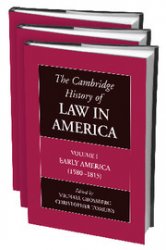The Cambridge History of Law in America
- Добавил: daromir
- Дата: 23-06-2018, 13:15
- Комментариев: 0

Автор: Michael Grossberg and Christopher L. Tomlins
Название: The Cambridge History of Law in America
Издательство: Cambridge University Press
Год: 2008
ISBN: 9780521803052; 9780521803069; 9780521803076
Язык: English
Формат: pdf
Размер: 15,6 mb
Страниц: 2624
Vol. I: Early America (1580–1815)
One of the most exciting recent trends in the history of American law has been the proliferation of scholarship on law in early America. Volume I of the Cambridge History of Law in America reaps the advantage of this proliferation, beginning the account of law in America with the very first moments of European colonization and settlement of the North American landmass. It follows those processes across two hundred years to the eventual creation and stabilization of the American republic. The book discusses the place of law in regard to colonization and empire, indigenous peoples, government and jurisdiction, population migrations, economic and commercial activity, religion, the creation of social institutions, and revolutionary politics. American legal history long treated the era of the founding of the republic and the early nineteenth century as the beginning of American law. Volume I disputes that tendency and corrects it. The Cambridge History of Law in America has been made possible by the generous support of the American Bar Foundation.
Vol. II: The Long Nineteenth Century (1789–1920)
Volume II of the Cambridge History of Law in America focuses on the 'long' nineteenth century, from the creation of the Republic to the immediate aftermath of the First World War - the century of continental expansion, urban growth, capitalist innovation, industrialization, and war. The crystallization and then, after the Civil War, the reinvention of a distinctly American state system is examined, as is the establishment and growth of systematic legal education, the spread of the legal profession, and the growing density of legal institutions. During this century, law becomes a technique of first resort wherever a person, institution, or government seeks to organize human activity. In this volume we see how law intertwines with religion, how it becomes ingrained in popular culture, and how it intersects with the distinct worlds of the American military and of international relations. The Cambridge History of Law in America has been made possible by the generous support of the American Bar Foundation.
Vol. III: The Twentieth Century and After (1920–)
Volume III of the Cambridge History of Law in America covers the period from 1920 to the present, 'the American Century'. It charts a century of legal transformations - in the state, in legal thought and education, in professional organization and life, in American federalism and governance, in domestic affairs and international relations. It shows how, politically, socially and culturally, the twentieth century was when law became ubiquitous in American life. Among the themes discussed are innovation in the disciplinary and regulatory use of law, changes wrought by the intersection of law with explosive struggles around race, gender, class and sexuality, the emergence and development of the particularly American legal discourse of 'rights', and the expansion of this discourse to the international arena. The main focus of this last volume of the Cambridge History of Law in America is the accelerating pace of change, change which we can be confident will continue. The Cambridge History of Law in America has been made possible by the generous support of the American Bar Foundation.
Внимание
Уважаемый посетитель, Вы зашли на сайт как незарегистрированный пользователь.
Мы рекомендуем Вам зарегистрироваться либо войти на сайт под своим именем.
Уважаемый посетитель, Вы зашли на сайт как незарегистрированный пользователь.
Мы рекомендуем Вам зарегистрироваться либо войти на сайт под своим именем.
Информация
Посетители, находящиеся в группе Гости, не могут оставлять комментарии к данной публикации.
Посетители, находящиеся в группе Гости, не могут оставлять комментарии к данной публикации.
